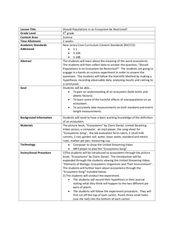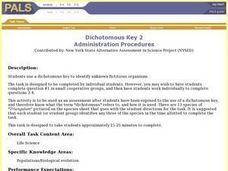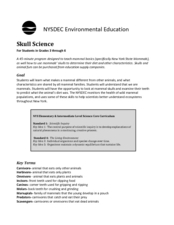Curated OER
Predator-Prey Simulation
Students simulate the interactions between a predator population of lynx and a prey population of rabbits. They collect and graph the data, then extend the graph to predict the populations for several more generations.
Curated OER
Hardy-Weinberg Made Easy: A Seventh Way
The purpose of this lesson is to slowly introduce the Hardy-Weinberg Law and population genetics to your students after you have completed Mendelian genetics. Using this format, you ease the students into the concept by relying on the...
Curated OER
Taxonomy
In this biology worksheet, students complete a crossword puzzle with 39 questions on taxonomy. They identify the different classification systems used in biology.
Curated OER
Food Chains and Webs
In this food chains worksheet, students identify the producers and consumers in the given food chains and describe how contaminants can biologically accumulate. This worksheet has 4 short answer questions.
Curated OER
Fisheries Project
Young scholars explore biology by completing a fishing worksheet. In this commercial fishery lesson, students identify the process of taking mass fish from the ocean and delivering them to eateries while discussing the negative aspects....
Curated OER
Little Red Hen
First graders explore biology by identifying plant anatomy in class. In this botany lesson, 1st graders read the book The Little Red Hen and identify the methods used in order to grow successful plants. Students discuss other ways people...
Curated OER
A Coastal Arctic Food Web
Students create a food web of the arctic ecosystem. In this biology lesson, students explain how global warming affects this ecosystem. They explain how losing a species affects the entire community.
Curated OER
Algae Experiments
Students describe the characteristics of algae. In this biology lesson, students perform a series of experiment to explore algae. They investigate the basic things algae need to survive.
Curated OER
Factors Affecting Plant Growth
Students determine the physical and chemical factors that affect plant growth. In this biology lesson, students explain the role of hormones in plants. They investigate how competition with other plants affect their growth.
Curated OER
Teacher Preparation Notes on Genetics
Students explore genetics through various hands-on activities. In this biology lesson, students predict the probability of offspring genotypes and phenotypes using the Punnett Square. They explain the causes of genetic abnormalities.
Curated OER
Biological Relationships - Coral Reef Memory Game and Chain Game
Young scholars familiarize themselves with the interconnectedness of species within an ecosystem, and to use this knowledge to evaluate how the removal or decimation of one species can have far reaching effects.
Curated OER
Should Populations in an Ecosystem be Restricted?
Fourth graders experiment to determine how overpopulation effects ecosystems specifically plants. For this ecosystem lesson, 4th graders conduct an ecosystems experiment after listening to Claire Daniel's, Ecosystems. They watch a video,...
Curated OER
Dichotomous Key 2
Students use a dichotomous key to identify unknown fictitious organisms in an assessment designed to be used after a discussion on the use of a dichotomous keys has occurred. Follow up questions about key included.
Curated OER
Biology: living Things and their Environment
Students recognize that organisms depend on other organisms. In this organism lesson, students understand symbiotic relationships and competition. Students explain food chains and food webs. Students understand that change is always...
Curated OER
Chesapeake Bay Population Studies
Students determine how to use a quarter meter quadrant to find population density, relative density, frequency and how to calculate a diversity index while participating in a virtual field trip. They study how to establish a Correlation...
Curated OER
Bean Bugs
Students practice how to estimate the size of a population of organisms. In this estimation lesson, students hypothesize how to estimate a population of organisms. Students learn to use a quadrat system to estimate population.
Curated OER
Hierarchical Organization in Biology: Students Presentations of Neurobiology
High schoolers gather (research) information on neuron structure and action potential. Students are guided to make inferences about the synapse and its relationship to neurotransmitter release and action. They are also guided to make...
Curated OER
The Biosphere
In this biosphere instructional activity, students identify the different levels of organization that ecologists study. Students complete charts, sentences, and answer short answer questions.
Curated OER
Biological Diversity and Conservation
In this biological diversity worksheets, students will use a word bank to fill in the blank of 8 statements about biological diversity. Then students will decided if 7 statements about the importance of biodiversity are true or false....
Curated OER
Ecosystem Vocabulary
In this ecosystem worksheet, students read descriptions and match the appropriate vocabulary term using ecosystem, habitat, community, and population. Students identify ten vocabulary terms.
Curated OER
Skull Science
What can your class learn from a skull? With proper facilitation, they can learn about diet, physical adaptations, special differences, and even the environment. Pupils will examine a series of mammal skulls and pelts to help them...
Curated OER
Wetland vs. Stream Macroinvertebrates
A link to a comprehensive macroinvertebrate guide gives you the information needed to prepare for this field study activity. Sample macroinvertebrates are collected from areas representing different environmental conditions. Junior...
Curated OER
What Parts of a Plant Do We Eat?
Did you know that tomtoes and cucumbers are actually fruits? Biology or botany beginners read about the function of flowers and fruit and find that some food items commonly called vegetables are, by definition, also fruits! Give learners...
Curated OER
Genes, Environments, and Behavior 2
Students explore the genetic and environmental factors that interact to produce variation in behavior across a population. They are introduced to the various approaches scientists use to explore this interaction. Students explore how...
Other popular searches
- Population Biology Predation
- Biology Population Ecology
- Global Population Biology
- Population Biology Marine
- Population Biology Lily Pad
- Biology Population Growth
- Biology Population Density
- Biology Population

























